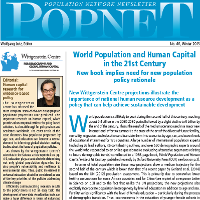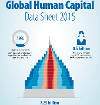The need for a new population policy rationale
In this issue:
- New population projections: New broader projections bring a fundamentally improved view of future population;
- Reprints from Science:
- Abel, GJ, Sander N (2014) Quantifying global international migration flows. Science, 343(6178), 1520–1522
- Lutz W, Butz W, KC S, Sanderson W, Scherbov S (2014) Population growth: Peak probability. Science, 346(6209), 561–561
- Lutz W, Muttarak R, Striessnig E (2014) Universal education is key to enhanced climate adaptation. Science 346(6213): 1061–1062
Feature articles:
Global Human Capital Data Sheet 2015
The Global Human Capital Data Sheet 2015 presents new population projections by age, sex, and level of educational attainment for the world. More
Education is key to climate adaptation
According to new IIASA research, education makes people less vulnerable to natural disasters such as floods, landslides, and storms that are expected to intensify with climate change. More
World population likely to peak by 2070
New population projections from IIASA researchers provide a fundamentally improved view of future population, structured by age, sex, and level of education, which differ from recent projections by the United Nations. More
Population projections
In a new blog post, IIASA's demographers explain why they project the world population to peak this century and UN demographers believe stabilization is unlikely. More
European Demographic Data Sheet 2014
The latest data sheet shows the relative population change 2013–2050 due to migration for 49 European countries. More
Highlights from the joint Wittgenstein Centre/IUSSP International Seminar
3 days, 9 sessions, 22 presentations, 1 roundtable discussion, 40 participants at the seminar on demography and climate change in Kao Lak, Phang Nga 23-25 Apr 2014 More
Since 1982 the World Population Program issues the POPNET newsletter for an extensive network of researchers and institutes working in the field of population and sustainable development. On a regular basis collaborators and interested individuals are provided with details of developments at the Program, current research, latest publications and information on forthcoming meetings and conferences.
PUBLICATIONS









